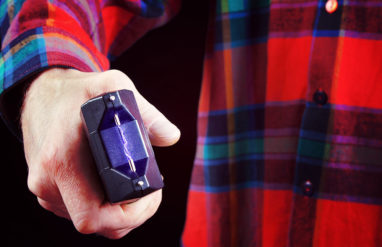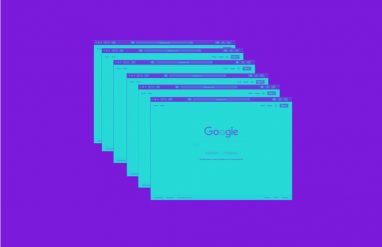Clickbait existed before clicking did
“When you find out what these kids are jumping into, your jaw will drop!”
“Baby ducks see water for the first time—can you BELIEVE what they do?”
Confronted with such emotionally charged lines, it’s almost impossible not to click. Do the tykes tumble into a vat of chocolate syrup? Are ducklings reaching for toothpaste to brush their beaks? Can you summon the willpower to direct your itching index finger away from the mousepad? Or, will you take the clickbait?
It’s easy to think the internet is to blame for the brain-tease-and-skeez that is upclickbait, or “the use of sensationalized headlines to lure people to click an online link.” We may be hypersensitive to clickbait because of the internet, but it’s actually been around for a lot longer than we thought. Clickbaiting is really just “yellow journalism,” by another name. Sensationalized news is nothing new. So, let’s take a closer look at the language used to get people to read something (whether misleading, or not) from criers to newspapers to the internet.
Town crier: the original clickbaiter?
The original clickbaiter was quite possibly the town crier in medieval Europe, bellowing the King’s news while interjecting teasers to visit the “finest” alehouse in the land. (After which, he’d shout a reminder that residents not pee or poop in the river the day before the alehouse brewed beer, a process that required drawing water from the, ideally excrement-free, river.) If this sounds like advertising, it is. If this sounds like providing just enough information to compel people to do certain things (like visit the alehouse and the outhouse), it is. Figuratively speaking, today’s clickbait also sends people to the alehouse or the outhouse; either to guzzle entertaining, intoxicating blather or to bear witness to the stinging stench of literary effluvium.
“Flip-bait” and yellow journalism
Clickbaiting speaks to the incestuous relationship between news and advertising, as the town-crier well recognized. Nineteenth-century journalism exploited this relationship and devised pre-clickbait baiting ruses of its own. In a heated circulation battle between the news giants of the 1890s—Joseph Pulitzer of the New York World and William Randolph Hearst of the New York Journal—exaggerated headlines, fake news, big scandals, emotional manipulation, and splashy pictures filled the dailies to entice readers to buy. Clickbait 1.0, or “flip-bait” of the era, tempting people to flip the page.
Newspapers that engaged in flip-bait exaggeration were practicing yellow journalism, so-called because a popular comic-strip character named Yellow Kid pranced around the pages of New York World in an effort to jack up sales. Dressed in a yellow night-shirt that served as his speech bubble, the bald man-baby from the slums said weird things like “Gee! Wots de matter? I feel turrible worse.,” “Dis is grate stuff!,” and “Hully gee!,” while smoking cigars, swigging champagne, and engaging in racist boxing matches. Preposterous as it may seem now, Yellow Kid got people flipping.
Clickbaiting today: you won’t BELIEVE the ploys to get you clicking
Over a hundred years later, clickbait pros like BuzzFeed, Upworthy, and now the Onion’s satirical ClickHole, continue to employ techniques ripe for hoaxes, hoodwinking, scandal-mongering, cheap thrills, and/or ridiculous oversimplification. When in search of a verbal “alehouse,” the techniques can be funny; when seeking legitimate news, the clickbait can make you feel like you’re in a stinking outhouse.
In the spirit of true clickbait culture, here’s a little listicle of some linguistic maneuvers content-creators deploy in their clickbait titles:
- “Connotation-rich vocabulary” (described by linguist Deborah Schaffer): like weird, shocking, pregnant, victim, sex, tragedy
- A longer emotionally-charged line describing a theme, followed by a shorter, cryptic sentence: “You’ll be astounded to know how Pixie the Monkey recovered. But, it’s not how you think.” The longer sentence usually features a variation of: “You’ll be shocked . . .” “You won’t believe . . .” “Your faith in humanity will be restored/destroyed . . . .” In other words, “We’re telling you you’ll feel this way, so you’ll click and make us money. Then, we’ll probably disappoint you.”
- Vague pronoun reference: “This will blow your mind,” (What, exactly?), “He’s finally calling it quits” (Who’s calling what quits, and who cares?).
- The teaser “what happens next” without any actual information about what happens next: “Male nurse knocked up four colleagues. With his fist. What happens next is insane.” (Right, a big brawny brawl in a hospital. Next.)
Whenever you feel the urge to curse the interwebs, remember clickbait isn’t new. Digital “clicking” technologies just make it more in-your-face, instantaneous, and omnipresent now.
Oh, and by the way, if you did take the clickbait to see what those kiddies were jumping into and just what the HECK those ducklings did—spoiler—it’s a swimming pool and the baby quackers drank the water.














